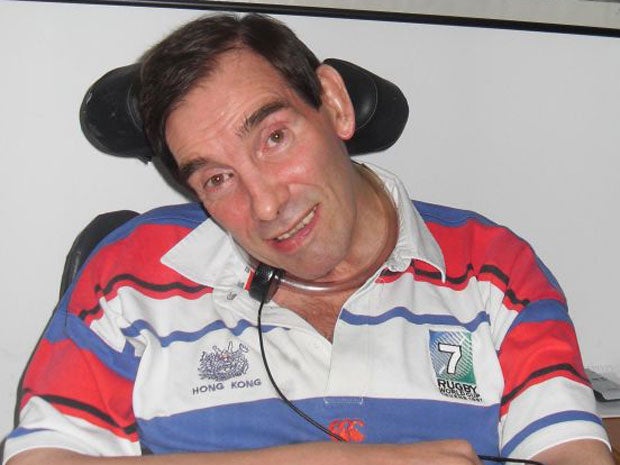Tony Nicklinson: A mind as sharp as his body was useless
Nina Lakhani recalls her heartbreaking interview with Tony Nicklinson and his wife

Tony and Jane Nicklinson are unforgettable. I have interviewed hundreds of people both as a mental health nurse and a journalist, many with harrowing, traumatic stories, but my interview with the Nicklinsons in December 2010 stands out as one of the very saddest. Their grief was poised, yet flagrant, and it has stayed with me.
Tony wept throughout the interview. His locked-in existence was plainly intolerable. His mind was still sharp, his body useless, his life meaningless. He cried as Jane explained that she would help end his life because she loved him, and that's what he wanted.
Jane said that she didn't know whether, if the time ever came and the law did change, she would actually be able to go through with it. But that wasn't the point. He couldn't live with his so-called life, and so, she would help him, one step at a time.
Theirs was a story about love, duty and loss. The couple met in 1984 in Dubai. He was a civil engineer, she a nurse. For the next 20 years they lived a comfortable expat life in the Middle East, Malaysia and Hong Kong, travelling extensively with their daughters, Lauren, now 25, and Beth, 23. Tony was very active in the expat community, a big noise in the rugby world. He loved his beer and whisky, revelled in political debate and had an opinion about everything.
He was a young man, just turned 51, when he suffered a catastrophic stroke in June 2005 while in Athens on business. Doctors fought hard to save his life, something that Tony now laments, because life as he had known it was destroyed. The Nicklinsons lost their home, their friends, their dogs. Tony had first believed that he would recover and no one had the nerve to tell him what the doctors were saying, but after a few months, when he realised that this was it, he started talking about wanting to die. Jane said: "At first it was really upsetting, but it wasn't a surprise, we knew it was coming, because that's just the person he is. Life like this is not enough for him. He said he would give it a couple of years to see if he could adjust, which he did, longer than that." But he couldn't.
"We always knew, the girls as well, that he wouldn't adjust. We knew it would come, I've tried to talk him out of it, we all have, we have talked it through, but not any more, this is what he wants."
His mind was made up, this was not a life that he could live with, and so, as a family, they agreed to support his quest for the right to die in his home. Yesterday's High Court judgment brought Tony's right to choose when and where he died, one step closer.
Their sadness, about what they'd lost and what the future held was pervasive. But theirs was also a story about oppressive routine that had in some ways, I felt, left Jane as locked-in as Tony.
I interviewed them shortly before Christmas, but there was nothing to look forward to, as it would be a day like any other, dictated by the carers' schedule every morning and night.
Jane wasn't depressed, but she was isolated and trapped. Although committed 100 per cent to Tony and his fight, she was without anything of her own to make getting up in the morning, something to look forward to.
"It's pretty lonely really; we were away for a long time, that's the biggest problem for me. I moan because I don't know anyone, but I don't really want to get to know anyone. It's the same thing every day, you get up at the same time, you go to bed at the same time, life is incredibly tedious," she told me, not complaining, just stating a fact.
It would be wrong to conclude that everyone who has locked-in syndrome feels like Tony. Research has found that many people adjust and live meaningful lives. There are locked-in DJs and writers and artists who, unlike Tony, do not want to die, despite what seems like a pretty terrible predicament. They still get pleasure from friends, family, books and music. But not Tony, and he wants the right to choose.
Going to the Swiss clinic Dignitas was then, and is now, an option – it could be arranged. But he could never see why he should go to a strange country with strangers to die; he wants to die at home with his family.
"What sort of society sends people abroad to die?" he asked me. I still have no answer to that question.
Join our commenting forum
Join thought-provoking conversations, follow other Independent readers and see their replies
Comments
Bookmark popover
Removed from bookmarks